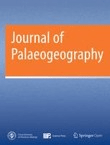
Journal of Palaeogeography-English
Scope & Guideline
Championing Open Access to Pioneering Research
Introduction
Aims and Scopes
- Palaeoenvironmental Analysis:
Research dedicated to reconstructing ancient environments through sedimentological, geochemical, and paleontological data, enabling a better understanding of past ecosystems. - Stratigraphy and Sedimentology:
Studies focusing on the stratigraphic distribution of sediments and their depositional environments, including the analysis of sedimentary structures and facies. - Paleobiogeography:
Exploration of the distribution of ancient organisms in relation to historical geography, providing insights into species evolution and migration patterns. - Geochemical and Mineralogical Investigations:
Research employing geochemical methods to understand the composition and alteration of sediments and rocks, which informs both paleoenvironmental conditions and resource exploration. - Ichnology and Trace Fossils:
The study of trace fossils to interpret the behavior and ecology of ancient organisms, offering clues about their interaction with the environment. - Paleoecological Dynamics:
Examination of the relationships between ancient organisms and their environments, focusing on how ecological interactions have changed through time.
Trending and Emerging
- Geochemical Proxy Studies:
A growing emphasis on utilizing geochemical proxies to reconstruct past environmental conditions, reflecting advancements in analytical techniques that enhance our understanding of ancient climates and ecosystems. - Impact of Climate Change on Geological Records:
Increasing research interest in how historical climate change events impacted sedimentation and biotic responses, emphasizing the relevance of paleogeographical studies to current climate discussions. - Integration of Remote Sensing and Geophysical Methods:
The incorporation of remote sensing technologies and geophysical methods into sedimentary studies is on the rise, allowing for more detailed spatial analyses of geological formations and their evolution. - Paleoecological and Biotic Interactions:
An emerging focus on understanding the interactions between ancient organisms and their environments, particularly how these relationships influenced evolutionary trajectories. - Sediment Provenance and Tectonic Influences:
Growing attention to the provenance of sediments and the tectonic processes that shape sedimentary basins, reflecting the importance of geological context in understanding sediment characteristics.
Declining or Waning
- Neogene and Quaternary Climate Studies:
Research focusing on the climatic conditions and geological events of the Neogene and Quaternary periods is becoming less frequent, possibly due to a shift toward more ancient geological periods or a focus on contemporary climate change. - Detailed Taxonomic Studies of Fossils:
While taxonomic studies are fundamental to paleontology, there appears to be a waning interest in exhaustive species descriptions in favor of broader ecological or geochemical studies. - Microfossil Assemblage Analysis:
Although microfossils remain important, there is a noticeable decline in studies solely concentrating on microfossil assemblages without integrating broader paleoenvironmental contexts.
Similar Journals
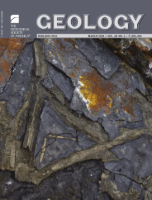
GEOLOGY
Advancing Earth Sciences Through Innovative ResearchGEOLOGY, published by the Geological Society of America, Inc, is a premier journal dedicated to advancing knowledge, research, and discussion in the field of geology. With an ISSN of 0091-7613 and an E-ISSN of 1943-2682, this journal stands out with an impressive Q1 ranking in Geology for 2023, positioning it among the top journals in the realm of Earth and Planetary Sciences, specifically holding a remarkable rank of 11 out of 321, reflecting its 96th percentile status. This journal aims to publish innovative research articles that cover all aspects of geology, from tectonics and sedimentology to paleontology and mineralogy, offering invaluable insights for researchers, professionals, and students alike. Although not currently open access, GEOLOGY maintains a rigorous review process ensuring the quality and integrity of the research it publishes. For more than five decades, spanning from its inception in 1973 to the upcoming publications in 2024, GEOLOGY has been instrumental in shaping the geological discourse and continues to be a vital resource for the scientific community.

CARNETS DE GEOLOGIE
Unveiling Earth's Secrets, One Study at a TimeCarnets de Geologie is a prominent open-access journal dedicated to the dynamic fields of geology, paleontology, and stratigraphy. Published by Carnets Geologie and based in France, the journal has been a platform for scholarly communication since 2002, facilitating unrestricted access to high-quality research. With a robust impact reflected in its 2023 quartile rankings—Q2 in Geology, Paleontology, and Stratigraphy—Carnets de Geologie ranks favorably within Scopus, positioning itself at the 60th percentile for Earth and Planetary Sciences. The journal aims to disseminate innovative research findings and foster academic discourse among researchers, professionals, and students interested in the intricate aspects of Earth's history and processes. Encompassing a broad scope that reflects continuous developments in the geological sciences, Carnets de Geologie is dedicated to advancing knowledge and understanding within its community.

E&G Quaternary Science Journal
Fostering Global Insights in Quaternary ResearchE&G Quaternary Science Journal, published by COPERNICUS GESELLSCHAFT MBH in Germany, stands as a prominent open-access platform dedicated to disseminating high-quality research in the fields of archaeology, geology, paleontology, and stratigraphy since its inception in 1979. With its ISSN 0424-7116 and E-ISSN 2199-9090, the journal has achieved remarkable recognition, indicated by its Q1 quartile ranking in archaeology across both arts and humanities sections, and its strong placements within the social sciences and Earth sciences categories. The journal provides crucial insights into the Quaternary period, contributing to our understanding of climate change, human evolution, and geological processes, making it invaluable for researchers, professionals, and students engaged in these collaborating disciplines. As an open-access journal since 2008, it ensures that cutting-edge research is readily available to a global audience, promoting knowledge exchange and facilitating advancements within the scientific community. The continuous commitment to excellence and its strategic focus on high-impact research positions E&G Quaternary Science Journal as a cornerstone publication in quaternary science.

BULLETIN OF GEOSCIENCES
Exploring the Dynamics of Our Planet, One Study at a TimeBULLETIN OF GEOSCIENCES, published by the prestigious Czech Geological Survey, stands as a pivotal resource in the fields of Earth and Planetary Sciences and Environmental Science. Since its inception in 2003, the journal has been committed to advancing knowledge through high-quality research, currently holding a commendable Q2 ranking in both disciplines. With its focus on diverse and innovative topics, BULLETIN OF GEOSCIENCES provides an essential platform for researchers, professionals, and students aiming to disseminate and access impactful studies. The journal is indexed in Scopus, ranking #78/195 in General Earth and Planetary Sciences and #110/233 in General Environmental Science, reflecting its significant contribution to academia. Publishing from Prague, Czech Republic, this journal invites contributions that illuminate the interactions between geological processes and environmental phenomena, ensuring an inclusive and accessible approach to crucial global issues.

Journal of Earth Science
Pioneering discoveries in geology and environmental science.Journal of Earth Science, published by the China University of Geosciences, Wuhan, is a leading journal in the field of Earth and Planetary Sciences, recognized for its significant contributions to the understanding of geological processes and environmental challenges. With an impressive Q1 ranking among Earth and Planetary Sciences journals and a strong position at Rank #39/195 in Scopus, this journal not only showcases high-quality research but also serves as a crucial platform for disseminating innovative findings, spanning a broad spectrum of topics from geophysics to climate change. The journal adopts an open access model, which enhances the visibility and accessibility of research articles published from 2009 to 2024, thereby facilitating collaboration and knowledge sharing among the global scientific community. With its commitment to advancing geosciences, Journal of Earth Science is invaluable for researchers, professionals, and students alike, eager to stay informed and contribute to ongoing discussions in this dynamic field.

PALAEONTOGRAPHICA ABTEILUNG A-PALAOZOOLOGIE-STRATIGRAPHIE
Decoding Earth's Layers: Your Resource for Pioneering ResearchPalaeontographica Abteilung A-Palaozoologie-Stratigraphie is a prominent academic journal that serves as a vital resource for researchers in the fields of Paleontology and Stratigraphy. Published by E Schweizerbart'sche Verlagsbuchhandlung in Germany, this journal has been instrumental in disseminating cutting-edge research from 1996 to 2024. With an established reputation highlighted by its Q3 ranking in both Paleontology and Stratigraphy, it ranks 26th among 113 journals in Paleontology and 15th among 55 in Stratigraphy, showcasing its significance within the scientific community. Although it does not currently offer open access, the journal provides an invaluable platform for the exchange of innovative ideas and findings in paleobiological and stratigraphic studies. As such, Palaeontographica continues to attract contributions from leading academics, making it an indispensable publication for professionals and students alike who are eager to advance their understanding of Earth's historical biological and geological patterns.
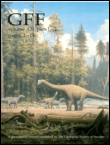
GFF
Connecting Scholars to the Rich History of Earth.GFF is a prestigious academic journal dedicated to advancing research in the fields of Geology and Paleontology. Published by Taylor & Francis Ltd in the United Kingdom, GFF serves as a vital platform for disseminating innovative findings and fostering discussions among researchers, professionals, and students alike. With a noteworthy impact factor reflecting its significance in the scientific community, GFF has achieved Q2 ranking in both Geology and Paleontology, underscoring its commitment to high-quality scholarship. The journal has been operational since 1872, accumulating a rich history of contributing to our understanding of earth sciences. It currently ranks #133 out of 321 in Earth and Planetary Sciences - Geology, and #50 out of 113 in Paleontology according to Scopus rankings. Although it does not offer an open access option, GFF remains accessible through various academic databases, ensuring that cutting-edge research reaches a wide audience. Its comprehensive scope aims to explore critical advancements in geological and paleontological sciences, making it an essential resource for those committed to exploring the intricacies of our planet’s past and present.
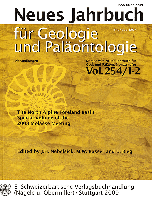
NEUES JAHRBUCH FUR GEOLOGIE UND PALAONTOLOGIE-ABHANDLUNGEN
Charting New Territories in Paleontological ResearchNEUES JAHRBUCH FUR GEOLOGIE UND PALAONTOLOGIE-ABHANDLUNGEN, published by E SCHWEIZERBARTSCHE VERLAGSBUCHHANDLUNG, is a distinguished scholarly journal based in Germany that has made significant contributions to the field of Earth and Planetary Sciences with a particular emphasis on Paleontology. With its ISSN: 0077-7749, this journal provides an essential platform for researchers, professionals, and students to explore cutting-edge research and developments that enhance our understanding of geological and paleontological processes. Boasting a robust ranking of #67 out of 113 in Scopus for the category of Earth and Planetary Sciences and achieving a Q3 quartile ranking in Paleontology, it stands as a significant resource in the global academic community. Though not an open-access journal, it offers valuable insights from 1987 onwards, ensuring a comprehensive archive of high-quality research articles published from 1995 to 2024. Its scholarly impact continues to resonate, making it a vital reference point for advancements in the ever-evolving disciplines of geology and paleontology.
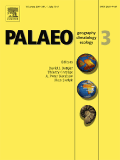
PALAEOGEOGRAPHY PALAEOCLIMATOLOGY PALAEOECOLOGY
Charting the Course of Climate and Ecosystem Change Through TimePalaeogeography, Palaeoclimatology, Palaeoecology, published by Elsevier and accessible via ISSN 0031-0182 (print) and E-ISSN 1872-616X (online), stands as a pivotal journal in the fields of Earth-Surface Processes, Ecology, Evolution, Behavior and Systematics, Oceanography, and Paleontology. With an impressive Impact Factor and ranking in the top quartile (Q1) across multiple categories, this journal facilitates cutting-edge research that explores the intricate relationships between past climates, environments, and ecosystems. Its scope encompasses a wide array of studies focusing on the geological and biological records that inform our understanding of contemporary ecological dynamics. Key objectives include advancing knowledge in palaeoecology and enriching discourse around climate change through rigorous research contributions. The journal's dedicated commitment to publishing high-quality, peer-reviewed articles makes it an invaluable resource for researchers, professionals, and students alike, providing insights essential for probing the factors shaping our planet's history. Positioned in the Netherlands and continuing its tradition of excellence since 1965, the Palaeogeography, Palaeoclimatology, Palaeoecology journal remains at the forefront of interdisciplinary research that bridges the past and future.
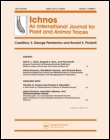
ICHNOS-AN INTERNATIONAL JOURNAL FOR PLANT AND ANIMAL TRACES
Discovering the Unseen: Traces That Shape Our Understanding of LifeICHNOS: An International Journal for Plant and Animal Traces is a premier scholarly journal published by Taylor & Francis Inc, focusing on the intricate field of paleontology. With an ISSN of 1042-0940 and an E-ISSN of 1563-5236, this journal serves as a vital platform for the dissemination of high-quality research centered on the traces left by plants and animals throughout geological history. Established in 1990 and with a convergence period extending to 2024, ICHNOS holds a Q3 category ranking in Paleontology according to the 2023 quartiles, positioning it within the 48th percentile of its Scopus-rank peer group. Although it does not currently offer Open Access options, the journal remains a valuable resource for researchers and professionals seeking to deepen their understanding of trace fossils and their implications for paleoecological studies. By contributing critical insights into the evolutionary chronicle of life on Earth, ICHNOS plays an essential role in advancing the dialogue within the earth and planetary sciences community.